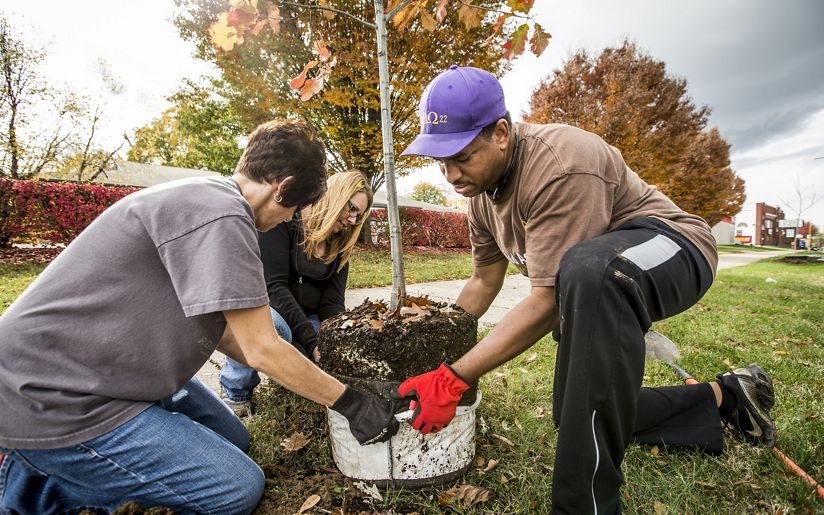- About
- Topics
- Story
- In-Depth
- Picks
- Opinion
- News
- Donate
- Signup for our newsletterOur Editors' Best Picks.Send
Read, Debate: Engage.
| December 16, 2016 | |
|---|---|
| topic: | Innovation |
| tags: | #Bamboo bicycle, #Christiana Figueres, #Ghana, #SEED Award, #UNFCC, #Winifred Selby, #World Bamboo Organization |
| located: | Ghana |
| by: | Bob Koigi |
Now 21, Winnie, as she prefers to be called, has created hundreds of jobs and produced thousands of bamboo bicycles through her social enterprise Ghana Bamboo Bikes Initiative in Kumasi, the second largest city in Ghana.
Tapping into the abundance of bamboo plantations in Ghana, Winnie together with the co-founders Kwame Kyei and Bernice Dapaah have now revolutionized transport in Ghana by making bicycles with frames from bamboo stalks. Winnie says the bicycle concept was started to tap into local renewable material while meeting the needs of the local communities.
They are sturdy, five times stronger than steel with the frames being shock resistant making them ideal to navigate through the rough terrain especially in rural Ghana.
Retailing at $100 in the local markets and $300 internationally, the bikes have become an instant hit with the enterprise’s biggest headache being meeting burgeoning demand. At one time there was a waiting list of 4,000 bicycles.
“It’s so sad and so serious that a common toothpick in my country has to be imported from other countries. We don’t do it ourselves because we look down on ourselves… We think foreigners are the people to make changes. It’s something that pains me because we have been blessed with so many things,” said Winnie in an earlier interview.
The company has employed over 50 workers most of them women and youth who have no source of income and no education to assemble the bikes. The idea is to train many more so that they can see value in the bamboo forests and create their own enterprises.
It takes two bamboo sticks to make one complete bicycle frame with an entire bicycle taking on average two days to complete.
To ensure steady supply of the raw material, the company has invested in a bamboo plantation in an area where the crop grows naturally and in abundance. But the project has received a commendation for its role in environmental conservation. In the wake of growing concerns over greenhouse gas emissions, alternative modes of transport like cycling are being fronted.
The markets for the bicycles spans from UK to USA with Bikes for Africa, a not for profit institution assisting in distribution especially to high-end markets. Through the arrangement, every bike sold to a high end market subsidies the cost of the bike back in Ghana for a school child or farmer.
Six months after producing their prototype, the enterprise won the 2010 SEED Award by the United Nations Environment Programme, an award that celebrates inspiring social and environmental entrepreneurs whose businesses can help meet sustainable development challenges.
The enterprise has gone on to win 10 other awards including Dubai International Award for 'best practice to improve the living environment, the 2013 UNFCC Momentum for Change Lighthouse Activity Award and the 2012 Samsung/Generations For Peace Award among others.
Bernice Dapaah, is also currently the World Bamboo Ambassador for the World Bamboo Organization.
Besides the awards, the bicycles have been catapulted to international limelight and caught the attention of global leaders.
In the 2013 Warsaw Climate Change Conference, UN secretary Ban Kimoon was so mesmerized by the bikes that he cycled in one of the bikes across the conference center.
The former executive secretary of the United Nation’s Framework Convention on Climate Change, UNFCC, Christiana Figueres also decided to enjoy a cycle around the center.
"They're made by women and these women are teaching other women to make these bamboo bikes and to sell them so that they have another income stream," she said expressing her excitement at the concept behind the bicycle.
Winnie, who has a passion for empowering African women and for tapping into local resources to add value and create sustainable and meaningful jobs for African women and youth, is now targeting more women to take up the challenge and assist her in mass producing the bicycles while looking for even more homegrown solutions to Ghana and Africa’s problem. It is a journey she is traveling a bamboo bicycle at a time.
By copying the embed code below, you agree to adhere to our republishing guidelines.
